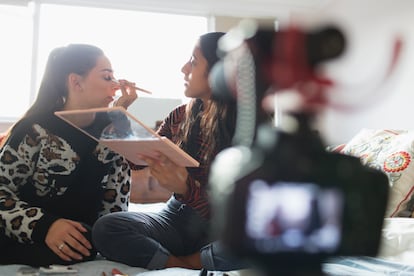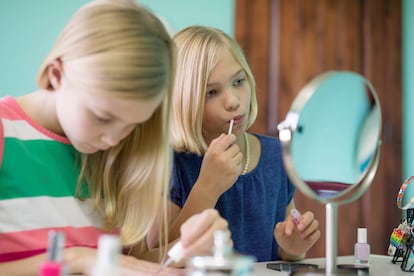How to prevent cosmetic addiction in minors: limit the use of technology and build up their self-esteem
The abuse of beauty products in girls and adolescents can damage their skin, while also causing anxiety or eating disorders. When parents are unable to handle the situation, it’s best to reach out to an expert, who can help their daughters learn to like themselves as they are and cultivate their social relationships


Scientific evidence supports the idea that adolescents and preteens shouldn’t have unfettered access to social media. This statement is supported by various studies, such as Windows of Developmental Sensitivity to Social Media – published in 2022 in Nature Communications – or Association of Habitual Checking Behaviors on Social Media With Longitudinal Functional Brain Development, published in 2023 by the American Psychological Association. Both research investigations indicate that exposure to these platforms can alter both the emotional well-being and neuronal development of minors between the ages of 12 and 18-years-old.
But these aren’t the only reasons to limit their access to social media. Minors can also be influenced by what they see other adolescents doing, such as influencers. This is one of the consequences of teenagers between the ages of 15 and 18 – especially on TikTok – recommending cosmetics, creams and makeup to an audience of girls as young as 10-years-old.
This situation has created a new mental health disorder in pubescent girls: “cosmeticorexia.” That is, excessive interest in the use of cosmetics and facial care products, which are often harmful to such young skin. “In [my] consultations, it’s surprising to observe the number of adolescents who have introduced a large number of products into their daily cosmetic routine,” says Elia Roó, a dermatologist and member of the Spanish Academy of Dermatology and Venereology. As she explains, the misuse of these products is due to the fact that teenagers usually don’t consult a dermatologist, but rather are guided by social media. They end up using cosmetics intended for adult skin. “The consequence is that they come to the [dermatological] consultation due to irritative dermatitis caused by products with high concentrations of active ingredients – such as retinol or alpha hydroxy acids, which they don’t know how to use – or due to an excess of comedogenic cosmetic products and makeup, [which produce excess oil]. This makes their acne worse,” she explains.
“The use of creams and serums with these types of ingredients – useful for preventing aging – can lead the skin to develop dermatological pathologies (such as dermatitis, skin irritations, or even sun intolerance) in the medium-term. The skin of a teenager around 13 or 14-years-old only needs good cleansing, hydration [or] sunscreen in their routine,” says Pilar Pérez Rivas, director of the master’s degree in Cosmetic Formulation and Dermopharmacy at the International University of La Rioja, in Spain. “However,” Pérez continues, “in recent years, we’ve seen a significant increase in cases of girls who are completely addicted to makeup and cosmetics, [a phenomenon] due to recommendations from influencers.”
These are the dermatological consequences. But there are also issues when it comes to emotional well-being. “[Linking] the essence of happiness to esthetics is already a very serious educational error. But if, additionally, we add the disproportionate and increasing need to use products to feel beautiful and be liked by others (which is what it’s all about), this starts to be a problem,” says child and family psychologist Mara Cuadrado. This situation worsens if teens become influencers. “Many girls and adolescents – when they have a significant number of followers on their networks – find themselves trapped in a virtual world, where they lose not only their childhood, but also control over themselves,” she adds.
Cuadrado explains that it’s at this moment when anxiety problems begin: “Other additional problems are generated, such as possible eating disorders, or even school abstention, since [the girls and teens] put making their videos before any other academic or family activity.”

On the other hand, as these youths are in the process of growth, they’re more vulnerable to whatever they see. “When they open their social media every day, they’re impacted by these publications and these reels in which images of perfect girls appear… they become convinced that they must also transmit that perfection. And this becomes a problem,” Pérez emphasizes. The university professor says that we must be especially careful with minors who have low self-esteem. “[We need to take care of] girls who have a certain addiction to technology, who want to be popular at all costs, or who dream of perfect skin and perfect hair.”
In any case, according to Cuadrado, we must differentiate the behavior of rehearsing adult roles (such as little girls who occasionally take their mother’s nail polish to paint their own) from the issue of becoming addicted to cosmetics and beauty products. This is when the girls or teens always feel compelled to show off their new look and influence their followers or friends, or even find themselves unable to go to school without completing their daily beauty routine.
Prevention, in the hands of parents
Limiting the use of technology, encouraging children and teens to have a good self-image, preventing them from wanting to belong to the adult world so quickly, educating them about image protection and teaching them forms of leisure other than technology are – for Cuadrado – some of the weapons that parents can use to avoid cosmeticorexia.
“Of course, it cannot be avoided that, when adolescence arrives, [youths] become more interested in their appearance, especially when they begin to have problems with acne or oily hair,” this psychologist clarifies. “That’s when they look for solutions and, sometimes, become obsessed with these types of [products] that promise the unattainable,” she continues. “That’s why it’s so important to remind them that not everything you see online is true,” Pérez also recommends.
Cuadrado explains that the best way to help these young women is to talk to them about the need that this obsession responds to. “Behind these excesses, there’s usually loneliness: girls who spend too much time alone in their rooms, without adults to interact with them.”
The psychologist adds that these minors also often feel insecurity, as well as an uncontrolled desire to influence others, or to be admired, recognized and accepted. This expert recommends that fathers and mothers seek out psychological professionals who can help their daughters learn to like themselves as they are, to not need followers, to cultivate good humor, intelligence, as well as familial and social relationships. “And, of course, they should go to a dermatologist to help them with skin problems… not to an esthetician.”
Sign up for our weekly newsletter to get more English-language news coverage from EL PAÍS USA Edition
Tu suscripción se está usando en otro dispositivo
¿Quieres añadir otro usuario a tu suscripción?
Si continúas leyendo en este dispositivo, no se podrá leer en el otro.
FlechaTu suscripción se está usando en otro dispositivo y solo puedes acceder a EL PAÍS desde un dispositivo a la vez.
Si quieres compartir tu cuenta, cambia tu suscripción a la modalidad Premium, así podrás añadir otro usuario. Cada uno accederá con su propia cuenta de email, lo que os permitirá personalizar vuestra experiencia en EL PAÍS.
¿Tienes una suscripción de empresa? Accede aquí para contratar más cuentas.
En el caso de no saber quién está usando tu cuenta, te recomendamos cambiar tu contraseña aquí.
Si decides continuar compartiendo tu cuenta, este mensaje se mostrará en tu dispositivo y en el de la otra persona que está usando tu cuenta de forma indefinida, afectando a tu experiencia de lectura. Puedes consultar aquí los términos y condiciones de la suscripción digital.








































